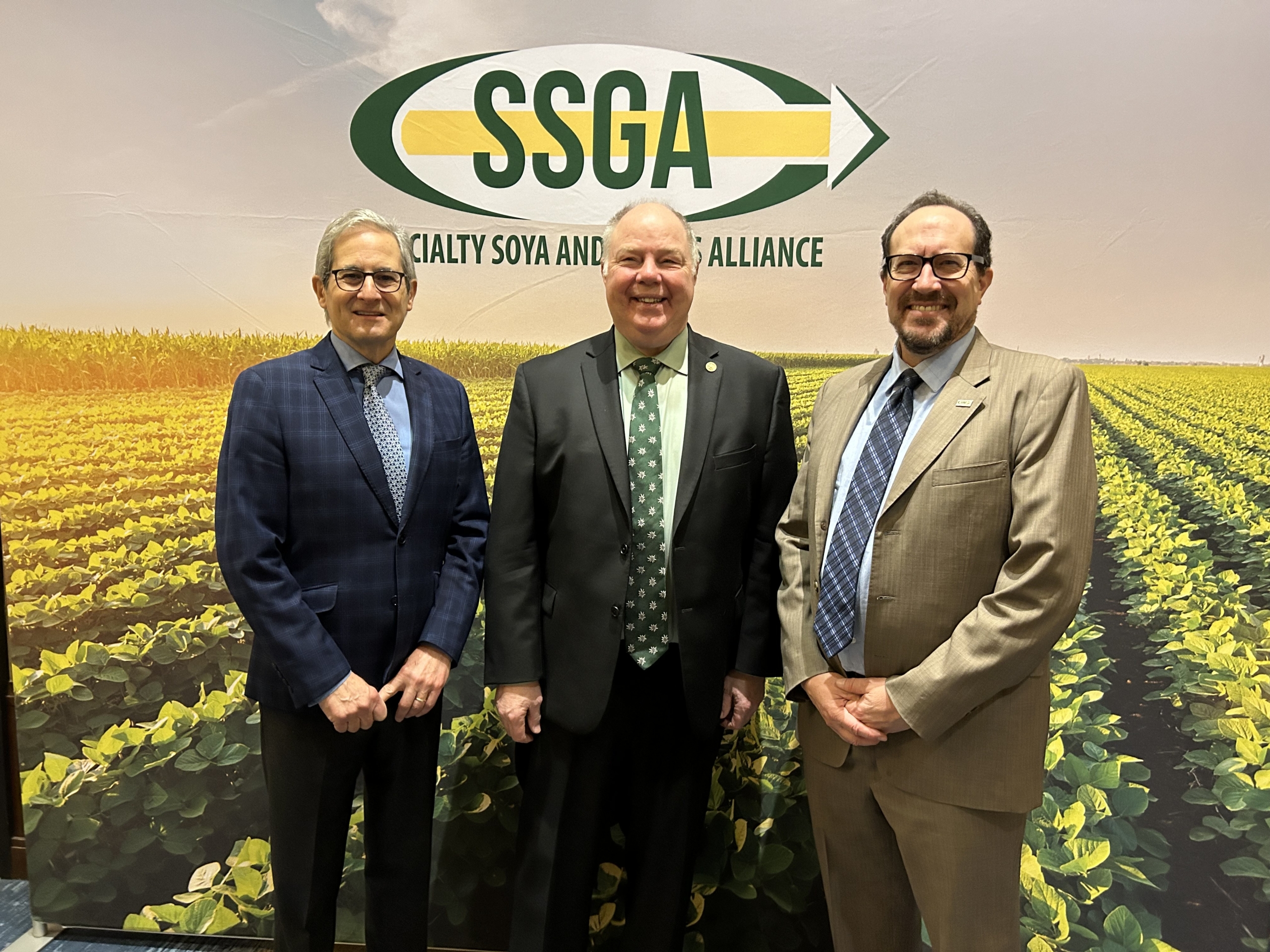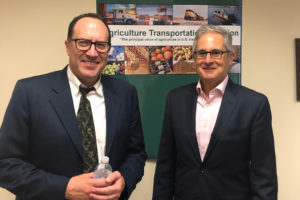A common theme occurred at the 2023 Transportation Go! conference: Ag logistics and transportation are complex and ever-evolving, and finding solutions to the problems facing the industry require strong relationships, collaboration and out-of-the-box thinking.
Led by the Specialty Soya and Grains Alliance (SSGA), more than 120 of the sharpest minds in the logistics and transportation industry descended on Omaha, Nebraska, on March 15-16 to work through some of those issues facing the movement of agriculture out of the Upper Midwest.
“When you have the type of influencers that you had at this conference, such as Federal Maritime Commission (FMC) Commissioner Max Vekich, this opportunity to let them know what is happening in the real world of logistics or exporting agricultural goods from the U.S. is so important,” said Darwin Rader of Zeeland Farm Services, SSGA vice chair and former chair of our competitive shipping action team. “It can’t be overstated as far as how influential all this information can be.”
Vekich addressed the crowd on Day 2 of Transportation Go! Of note, he discussed last summer’s passage of the Ocean Shipping Reform Act (OSRA) – a bill and now-law strongly supported by SSGA – and changes within the FMC, including the charge-complaint mechanism, which he encouraged attendees to file if they feel action is needed.
“We want to make it so we’re a real regulatory agency,” said Vekich, a former longshoreman and Washington state legislator. “We’re going to stick up for the little guy. We’re not going to stand on the sideline; we’re going to get into the game and issue yellow cards, red cards, whatever it takes. … As shippers, you deserve a fair shot.”
While OSRA already has had a positive impact on U.S. exporters, the FMC is currently in the rulemaking process for enforcement of OSRA policy.
Attendees heard a wide range of presentations throughout the two-day conference, including current economic and supply chain trends and updates on trucking, rail and ocean shipping.
SSGA Executive Director Eric Wenberg highlighted the importance of the conference, and how it sparks action for attendees afterward.
“The transportation system isn’t really a system,” Wenberg said. “So we have to actively ask these transportation and logistics professionals to work together. Transportation is not seamless. As we’ve heard at this conference, there are obstacles in every transaction, sometimes insurmountable, but that there is relief on the way with the Federal Maritime Commission’s upcoming demurrage rule, which is going to provide relief we’ve sought for a long time.”
Other highlights:
David Briggs of Scoular addressed attendees about economics and the supply chain. He gave an update on the ports of Los Angeles and Long Beach, stating that they have recovered from the 2021 backlog, to having no ships in the queue as of March 2023.
Briggs highlighted two factors for the audience: Consumer spending during the pandemic and after has shifted, impacting how ocean carriers move freight; the West Coast ports are important to the global economy.
“If there is a problem with labor on the West Coast, it’ll affect everyone in the world,” he said.
Luisa Fernandez-Willey of the Association of American Railroads discussed the challenges for the rail system in the U.S., noting that industrial products drive manufacturing, and when there is a decline in industrial products, ultimately there is a decline in manufacturing, which impacts the rail system.
“Now that the economy has recovered, the demand for gasoline and petroleum products has increased,” she said.
She too pointed to consumer behavior, which drives intermodal shipping. Fernandez-Willey said during the pandemic, people bought items of comfort, which shifted the types of production of goods that were being shipped.
“There’s a very strong relationship between the economy and goods,” she said. “When the economy is doing well, rail is strong.”
While carloads of grain are down 9.7% from last year, she said, those are expected to rise by year’s end.
Brenda Snyder of HRG Search talked to attendees about recruiting, training and retaining shipping and logistics employees, which she said are some of the most sought after in the industry. Snyder said that by the time potential employees reach the university level, it is often too late to attract them to the industry.
“How do we get people at these kinds of events?” she said in reference to Transportation Go! “My guess is you all have kids, grandkids, nieces and nephews. Bring them with. Maybe they’d have an interest in this. You’re talking trains, planes, ships, trucks. Think about the coolness about what you have to do to get stuff all over the place. You have the cool stuff.”
Agricultural logistics, Snyder said, are mission-driven and involve not only solving big, mammoth, complex problems, but also feeding humans. “If you can’t market talent out of that, get a new marketing agency.”
John Wolfe of the Northwest Seaport Alliance reported that, with declining demand and reduced costs in imports, along with elevated inventories, that carriers are refocusing on exports. “Balanced trade is important,” he said, “so we’re working on solutions to help exporters get access to equipment.”
Partnerships are key, and the Northwest Seaport Alliance works with USDA and inland railyards to help containers reach the middle of America.
Wolfe also gave an update about the expansion happening in the ports of Seattle and Tacoma, Wash. Wolfe dispelled the narrative that the West Coast doesn’t have room for growth. He pointed to the expansion of 20-foot equivalent (TEU) container capacity, and the increase in port depth to 57 feet of water in the ports.
Shane Kinne of Coalition to Protect the Missouri River discussed the untapped potential of the Missouri River in moving product down to the Gulf of Mexico via the Mississippi River. More than 5.5 million tons of cargo move on the Missouri, and $278 million in infrastructure funds are earmarked for development on the United States’ longest river.
“It’s been an often-overlooked waterway over several decades,” Kinne said. “But we’re starting to see opportunities pay off.”
Peter Hirthe of the Great Lakes St. Lawrence Seaway Development Corporation noted that, as a trade lane, the Great Lakes and St. Lawrence Seaway is underutilized, only running about 50% capacity. Considering the region surrounding that area is the third-largest economy in the world, “there’s room to grow.”
“Canada uses it more but doesn’t have the PNW (U.S. Pacific-Northwest ports) or the river system,” he said. “But we can improve the ratio of U.S. exports.”
U.S. grain exports on the system were up 4.3% last year, and there have been several developments, with more on the way, including new or expanded infrastructure and facility developments at Duluth-Superior (Minn.-Wis.), Milwaukee (Wis.), Monroe (Mich.) and Oswego (N.Y.), as well as upcoming opportunities at Cleveland (Ohio), Burns Harbor (Ind.) and Green Bay (Wis.).
Alex Leslie of the American Transportation Research Institute discussed the challenges facing the trucking industry, including the aging driver demographic. Most are in the 45- to 64-year-old range. “This is a challenge for a couple reasons,” he said. “One, we have retiring drivers and we need to fill those gaps. Two, we need young people to learn and grow in this industry.”
Wage increases have helped, but lifestyle, including work-life balance remains an issue.
Availability of truck parking is also a top concern, he said.
Elaine Trevino of the U.S. Department of Transportation updated on the Supply Chain Task Force and discussed DOT initiatives for tracking and tracing, including the Ocean Shipping Container Availability Report (OSCAR) and a voluntary forecasting tool called Freight Logistics Optimization Works (FLOW).
“We see a need for improved transparency/accountability across all supply chains,” she said. “In the mid-term, we seek to improve and institutionalize data sharing. This industry is very opaque and lacks data.”
Competing and succeeding in the international marketplace, she said, requires being prepared to deal with uncertainty and knowing potential risks and opportunities.
Maria Bodnar of Ocean Network Express (ONE), discussed modernization and improvement to the shipping line, including new vessels, green initiatives and energy efficiencies, along with acquisition of terminals at various ports, putting ONE in control of some entire supply chains.
“We’re focused on smooth operations within the supply chain,” she said. “Communication is critical. We want to recover ocean shipping integrity. … We can be a good partner of the ag community.”
Brittany Batz of Cobblefield LLC served as Transportation Go’s moderator. She is an independent consultant focused on facilitating digitization and process improvement in the agriculture industry. Her company helps others drive operational efficiencies and enhance productivity through the implementation of digital solutions.
Transportation Go! was sponsored at the Show level by the Nebraska Department of Agriculture, along with the state’s corn, soybean, wheat and ethanol boards.
Platinum sponsors included the Minnesota Soybean Research & Promotion Council, South Dakota Soybean Checkoff, Illinois Soybean Association, North Dakota Soybean Council, Wisconsin Soybean Marketing Board, North Dakota Corn Council, Great Lakes St. Lawrence Seaway Development Corporation and Norseman Protective Solutions.
Gold sponsors included the Ohio Soybean Council and Scoular. Other sponsors included Buffers USA, Hang Tung Resources and Ray-Mont Logistics.





